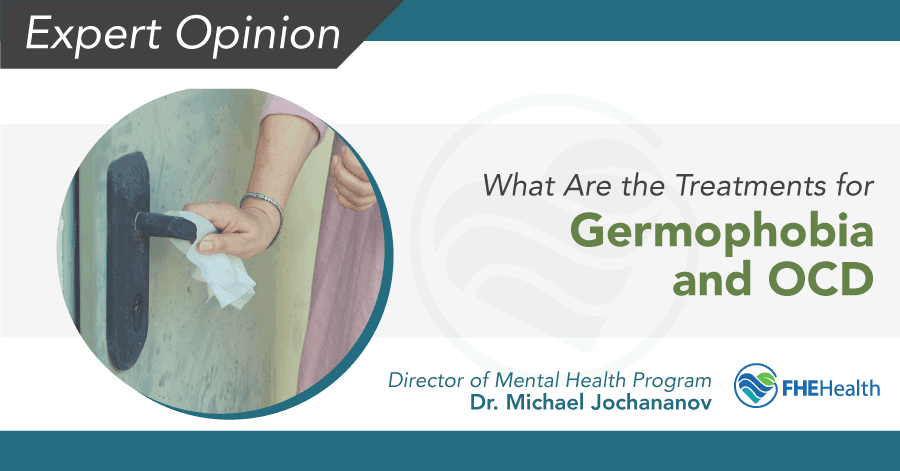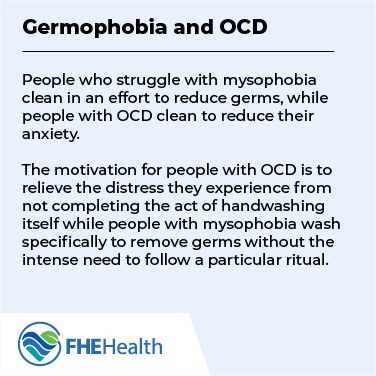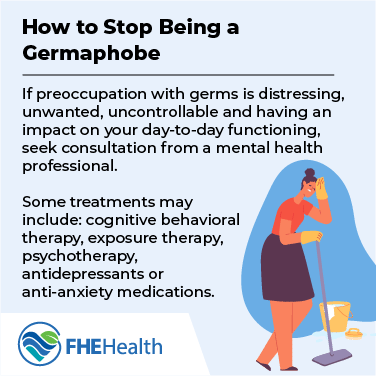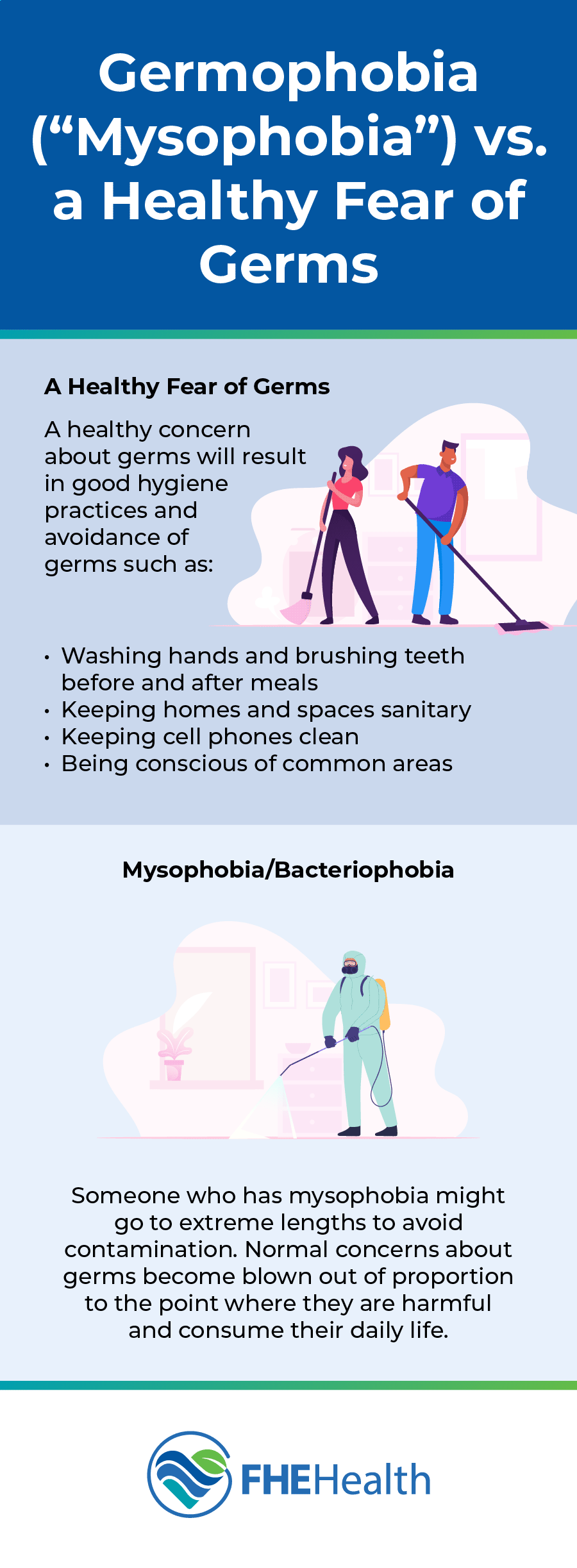
This article has been reviewed for accuracy by our peer review team which includes clinicians and medical professionals. Learn more about our peer review process.
The advent of COVID-19 drastically changed social mores regarding hygiene. The prospect of contracting the coronavirus sensitized many Americans—who would usually not think much about germs—to their reality and the dangers of minimizing them. It is no wonder that rates of germophobia and, relatedly, obsessive-compulsive disorder (OCD) have risen in this climate of heightened vigilance toward germs.
Higher rates of germophobia and OCD notwithstanding, there remains confusion about these mental health conditions and about how they are related and how to address them. Sometimes, the line between a healthy level of concern about germs and a diagnosable fear of these microorganisms can be hard to discern; and, while germophobia and OCD frequently co-occur, exactly how is not always clear.
For help with these questions, we turned to Dr. Michael Jochananov, who directs the mental health treatment program at FHE Health. “Restore,” as it is called, is an inpatient program for people who need sub-acute care for a wide range of mental illnesses. When it comes to germophobia, Dr. Jochananov has seen the full range of cases, from the mild to the most severe. In his words:
In the mild range, prior to COVID, I have seen individuals who use an excessive amount of hand sanitizer, wash hands whenever possible after going in and out of doors, or use hand sanitizer/wipes to clean hands after entering and exiting their car, homes, etc.
In the most severe case that I worked with, the individual had a schedule/ritual of cleaning herself and her children from the moment they awoke. She used cleaning chemicals to clean herself and her children, causing chemical burns in addition to using hot, scalding water. She isolated from others, did not allow her children to receive vaccines for school and would disinfect and wash herself and her children’s clothing throughout the day.
With that as a backdrop, what follow are Dr. Jochananov’s answers to some of the most commonly asked questions about germophobia and OCD.
Germophobia (“Mysophobia”) vs. a Healthy Fear of Germs
What is the difference between germophobia (in medical terminology, more accurately known as “mysophobia”) and a healthy or “normal” fear of germs?
A Phobia of Germs
To answer this question, Dr. Jochananov began by defining phobias: “We all have concerns and cautions, but phobias are viewed as unreasonable or excessive, resulting in a high level of distress compared to standard concerns or fears,” he said. “The distress and anxiety caused by mysophobia are out of proportion to the damage that common germs are likely to cause.”
A Healthy Fear of Germs
What, then, might constitute a “normal” or healthy level of concern about germs and cleanliness? Here is how Dr. Jochananov answered that:
It is normal to be concerned about germs in general such as bacteria, viruses and/or parasites, so we don’t get sick. We do this by trying to avoid cross-contamination of foods, exposure to the bodily fluids of others, and pursuing and maintaining healthy hygiene. As such, a healthy concern about germs will result in good hygiene practices and avoidance of germs such as:
- washing our hands and brushing our teeth before and after meals
- keeping the space that we occupy sanitary, such as our home, the area where we work and our car
- keeping our cell phone clean
- being conscious of common areas
Mysophobia/Bacteriophobia?
For someone with mysophobia, on the other hand? “These normal concerns become blown out of proportion to the point where they are harmful and consume our daily life in most if not all areas such as work, school, or relationships; and can result in the opposite desired effect and be detrimental to our health,” Dr. Jochananov said. “For these individuals, avoiding germs is more than just a precautionary measure—it becomes a disorder. Someone who has mysophobia might go to extreme lengths to avoid contamination.”
Germaphobic Signs to Look for
If fears of germs are interfering with your daily life and you’re wondering whether they may be a diagnosable condition, it may be helpful to know what signs to look for.
“Because mysophobia causes a high level of distress, the symptoms are similar to anxiety,” according to Dr. Jochananov. He said the following symptoms may be signs of germaphobia:
- Repeated, uncontrollable worries about getting sick or being exposed to germs
- Avoiding people, places, or things that are perceived as germ-filled
- Spending excessive time cleaning and decontaminating
- Washing hands/showering/brushing teeth obsessively
- Avoiding/refusing to share personal items
- Keeping away from physical contact with others
- Fearing being contaminated by children
- Keeping away from crowds or animals
- Intense fear or terror about contamination
- Physical symptoms of anxiety, such as rapid heartbeat, stomach upset, and sweating when confronted with something that triggers the fear of germs
What Is the Link Between Germophobia and OCD?
 In a nutshell, handwashing, Dr. Jochananov said. He noted that handwashing is one of the most common symptoms of mysophobia and “coincidentally, the most common and well-known symptom of OCD.”
In a nutshell, handwashing, Dr. Jochananov said. He noted that handwashing is one of the most common symptoms of mysophobia and “coincidentally, the most common and well-known symptom of OCD.”
“The important difference,” Dr. Jochananov continued, “is that people who struggle with mysophobia clean in an effort to reduce germs, while people with OCD clean (a.k.a engage in this ritual behavior) to reduce their anxiety. These individuals’ lives are ruled by compulsions that are designed to relieve anxiety, such as handwashing and sanitizing.
In other words, “the motivation for handwashing is different: People with OCD ‘need’ to relieve the distress they experience as a result of the non-completion of the act itself (handwashing, disinfecting, etc.), while people with mysophobia wash specifically to remove germs without the intense need to follow a particular ritual to completion.”
This critical distinction between germophobia and OCD means that “it’s possible to have germophobia without OCD, and vice versa.” At the same time, “some people have both germophobia and OCD.
Overcoming Fear of Germs – and How to Stop Being a Germaphobe
 A fear of germs that is interfering with daily life and causing anxiety can be distressing. The good news is that help is available, and that with treatment you can learn effective strategies for managing the symptoms and learning how to stop being a germophobe.
A fear of germs that is interfering with daily life and causing anxiety can be distressing. The good news is that help is available, and that with treatment you can learn effective strategies for managing the symptoms and learning how to stop being a germophobe.
Dr. Jochananov’s advice: “If you, or someone you know has a preoccupation with germs that is distressing, unwanted, uncontrollable and having an impact on day-to-day functioning, seek consultation and clarity form a mental health professional. Do not self-diagnose. A concern is that someone who is a “germophobe” may believe they have OCD, but that isn’t always the case.”
For those wondering about what type of treatment is best for germophobia and/or OCD, Dr. Jochananov had this to say:
The most effective course of treatment is a combination of Cognitive Behavioral Therapy, most notably exposure therapy. It aims to desensitize the client and involves gradual exposure to germ triggers to reduce intensity and duration of anxiety and fear caused by the thoughts of germs. The goal is for the client to regain control of their thoughts about germs, which in turn can result in a healthy change of behavior and improved daily functioning. Additionally, further psychotherapy designed to address any underlying causes can be helpful and strengthen a person’s recovery. The use of antidepressants and anti-anxiety medications can also assist in addressing symptoms.
Are your fears of germs becoming unmanageable and causing anxiety? Contact FHE Health today. We may be able to help.







